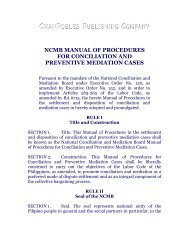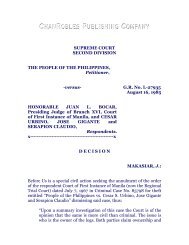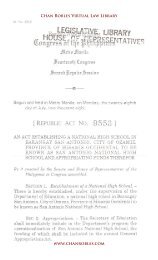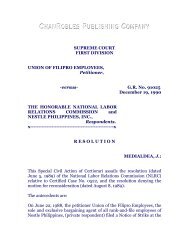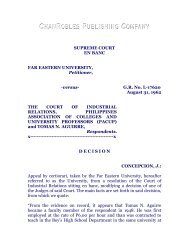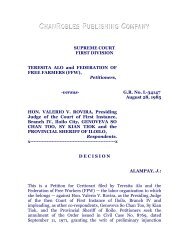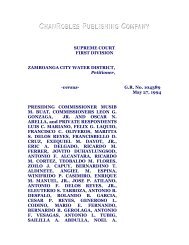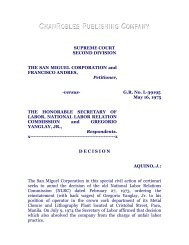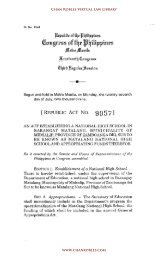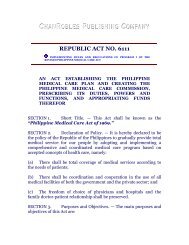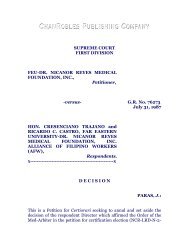Labor laws of the philippines - Chan Robles and Associates Law Firm
Labor laws of the philippines - Chan Robles and Associates Law Firm
Labor laws of the philippines - Chan Robles and Associates Law Firm
Create successful ePaper yourself
Turn your PDF publications into a flip-book with our unique Google optimized e-Paper software.
Pre-Week Guide on <strong>Labor</strong> <strong>Law</strong> 2006 Bar Examinations Pr<strong>of</strong>. Joselito Guianan <strong>Chan</strong><br />
In ano<strong>the</strong>r case where <strong>the</strong> company used to pay to its drivers <strong>and</strong> conductors, who were<br />
assigned outside <strong>of</strong> <strong>the</strong> city limits, aside from <strong>the</strong>ir regular salary, a certain percentage <strong>of</strong> <strong>the</strong>ir<br />
daily wage, as allowance for food, it was ruled that <strong>the</strong> company should continue granting <strong>the</strong><br />
said privilege. (Cebu Autobus Company vs. United Cebu Autobus Employees Association, G. R.<br />
No. L-9742, Oct. 27, 1955).<br />
GRATUITY AND ALLOWANCES:<br />
69. What is a gratuity?<br />
“Gratuity” is a gift freely given by <strong>the</strong> employer in appreciation <strong>of</strong> certain favors<br />
or services rendered. It is not part <strong>of</strong> wages since, strictly speaking, it is not intended<br />
as compensation for actual work. It is fur<strong>the</strong>r not dem<strong>and</strong>able as a matter <strong>of</strong> right.<br />
70. Are allowances part <strong>of</strong> wage?<br />
BONUS:<br />
"Allowances" are not part <strong>of</strong> wages. Therefore, in <strong>the</strong> computation <strong>of</strong> <strong>the</strong> amount<br />
<strong>of</strong> retirement <strong>and</strong> o<strong>the</strong>r benefits, allowances shall not be included <strong>the</strong>rein.<br />
71. What is bonus? Is it dem<strong>and</strong>able?<br />
“Bonus” is an amount granted <strong>and</strong> paid ex gratia to <strong>the</strong> employee for his industry or<br />
loyalty, hence, generally not dem<strong>and</strong>able or enforceable. If <strong>the</strong>re is no pr<strong>of</strong>it, <strong>the</strong>re<br />
should be no bonus. If pr<strong>of</strong>it is reduced, bonus should likewise be reduced, absent any<br />
agreement making such bonus part <strong>of</strong> <strong>the</strong> compensation <strong>of</strong> <strong>the</strong> employees.<br />
72. When is bonus dem<strong>and</strong>able <strong>and</strong> enforceable?<br />
On <strong>the</strong> basis <strong>of</strong> equitable considerations, long practice, agreement (e.g., CBA)<br />
<strong>and</strong> o<strong>the</strong>r peculiar circumstances, bonus may become dem<strong>and</strong>able <strong>and</strong> enforceable.<br />
Consequently, if bonus is given as an additional compensation which <strong>the</strong> employer<br />
agreed to give without any condition such as success <strong>of</strong> business or more efficient or<br />
more productive operation, it is deemed part <strong>of</strong> wage or salary, hence, dem<strong>and</strong>able.<br />
Unlike 13 th month pay, bonus may be forfeited in case employee is found guilty<br />
<strong>of</strong> an administrative charge.<br />
Bonus, when considered a company practice.<br />
To be considered a “regular practice,”, <strong>the</strong> giving <strong>of</strong> <strong>the</strong> bonus should have been done<br />
over a long period <strong>of</strong> time, <strong>and</strong> must be shown to have been consistent <strong>and</strong> deliberate. (Globe<br />
Mackay Cable <strong>and</strong> Radio Corporation vs. NLRC, G.R. No. L-74156, 163 SCRA 71).<br />
The test or rationale <strong>of</strong> this rule on long practice requires an indubitable showing that <strong>the</strong><br />
employer agreed to continue giving <strong>the</strong> benefits knowing fully well that said employees are not<br />
covered by <strong>the</strong> law requiring payment <strong>the</strong>re<strong>of</strong>. (National Sugar Refineries Corporation v. NLRC,<br />
G.R. No. 101761, 220 SCRA 452).<br />
Thus, even if <strong>the</strong> bonus has been given for quite some time or since “time-immemorial”<br />
as asserted by <strong>the</strong> union, in an amount equivalent to two (2) months gross pay for mid-year bonus<br />
<strong>and</strong> three (3) months gross pay for <strong>the</strong> year-end bonus, <strong>the</strong> employer may validly reduce it to two<br />
(2) months basic pay for mid-year bonus, <strong>and</strong> two-months for year-end bonus, without violating<br />
<strong>the</strong> non-diminution clause in <strong>the</strong> law since bonuses are not part <strong>of</strong> labor st<strong>and</strong>ards in <strong>the</strong> same<br />
class as salaries, cost-<strong>of</strong>-living allowances, holiday pay <strong>and</strong> leave benefits, provided under <strong>the</strong><br />
<strong>Labor</strong> Code. The contention <strong>of</strong> <strong>the</strong> union that <strong>the</strong> granting <strong>of</strong> said bonuses had ripened into a<br />
company practice that may no longer be adjusted to <strong>the</strong> prevailing condition <strong>of</strong> <strong>the</strong> bank has no<br />
legal <strong>and</strong> moral bases. Its fiscal condition having declined, <strong>the</strong> bank may not be forced to<br />
distribute bonuses which it can no longer afford to pay <strong>and</strong>, in effect, be penalized for its past<br />
20


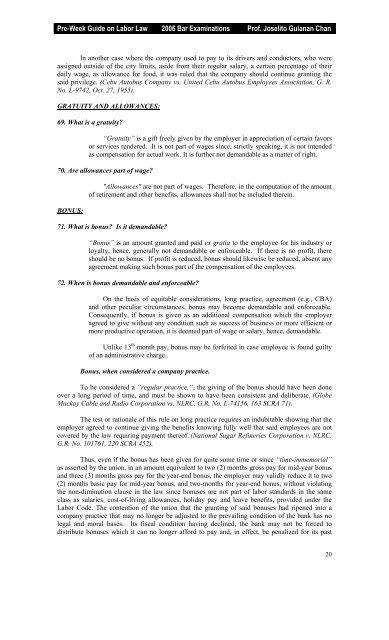
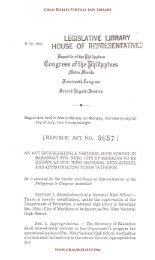
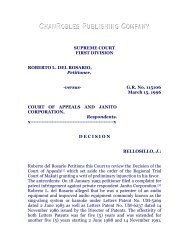
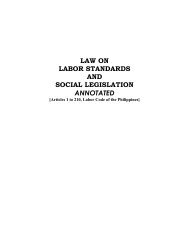
![Aurelio vs. NLRC, (221 SCRA 432 [1993]) - Chan Robles and ...](https://img.yumpu.com/51280528/1/190x245/aurelio-vs-nlrc-221-scra-432-1993-chan-robles-and-.jpg?quality=85)
